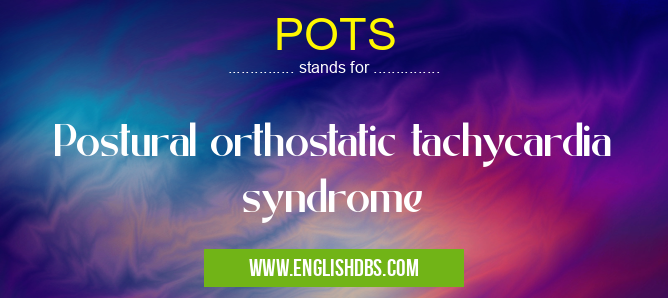What does POTS mean in SYNDROMES
POTS stands for Postural Orthostatic Tachycardia Syndrome. It is a condition that affects the circulatory system and causes an abnormally rapid heart rate (tachycardia) upon standing up from a lying or sitting position.

POTS meaning in Syndromes in Medical
POTS mostly used in an acronym Syndromes in Category Medical that means Postural orthostatic tachycardia syndrome
Shorthand: POTS,
Full Form: Postural orthostatic tachycardia syndrome
For more information of "Postural orthostatic tachycardia syndrome", see the section below.
Symptoms of POTS
- Lightheadedness or dizziness upon standing
- Fatigue
- Brain fog
- Heart palpitations
- Shortness of breath
- Nausea
- Exercise intolerance
Causes of POTS
The exact cause of POTS is unknown, but it is believed to involve a malfunction of the autonomic nervous system, which controls involuntary bodily functions such as heart rate and blood pressure. Some potential triggers include:
- Dehydration
- Hormonal changes
- Autoimmune disorders
- Medications
Diagnosis of POTS
POTS is diagnosed based on a physical exam and a tilt table test. The tilt table test involves lying on a table that is tilted upright to simulate standing. During the test, the doctor will monitor heart rate and blood pressure to assess for orthostatic tachycardia.
Treatment for POTS
Treatment for POTS typically focuses on managing symptoms and improving circulation. Common treatments include:
- Increasing fluid intake
- Wearing compression garments
- Exercising regularly
- Medications, such as beta-blockers or fludrocortisone
Essential Questions and Answers on Postural orthostatic tachycardia syndrome in "MEDICAL»SYNDROMES"
What is POTS?
Postural orthostatic tachycardia syndrome (POTS) is a condition that affects the body's ability to regulate blood pressure and heart rate. When someone with POTS stands up from a lying or sitting position, their blood pressure drops and their heart rate increases. This can cause a variety of symptoms, including lightheadedness, dizziness, fainting, fatigue, and blurred vision.
What causes POTS?
The exact cause of POTS is unknown, but it is thought to be related to a problem with the autonomic nervous system, which controls the body's automatic functions, such as heart rate, blood pressure, and digestion.
Who is at risk for POTS?
POTS is most common in young women, but it can affect people of all ages and genders. People who have a family history of POTS are at an increased risk of developing the condition.
What are the symptoms of POTS?
The most common symptoms of POTS are lightheadedness, dizziness, and fainting. Other symptoms can include fatigue, blurred vision, headache, nausea, and difficulty concentrating.
How is POTS diagnosed?
POTS is diagnosed with a tilt table test. This test involves lying on a table that is tilted up to a standing position. Your blood pressure and heart rate will be monitored during the test. If your blood pressure drops and your heart rate increases when you stand up, you may have POTS.
How is POTS treated?
There is no cure for POTS, but the symptoms can be managed. Treatment options include lifestyle changes, such as increasing fluid intake and avoiding caffeine and alcohol, and medications, such as beta-blockers and midodrine.
Final Words: POTS is a condition that can cause significant discomfort and impact daily life. However, with proper diagnosis and treatment, most individuals with POTS can manage their symptoms and improve their quality of life.
